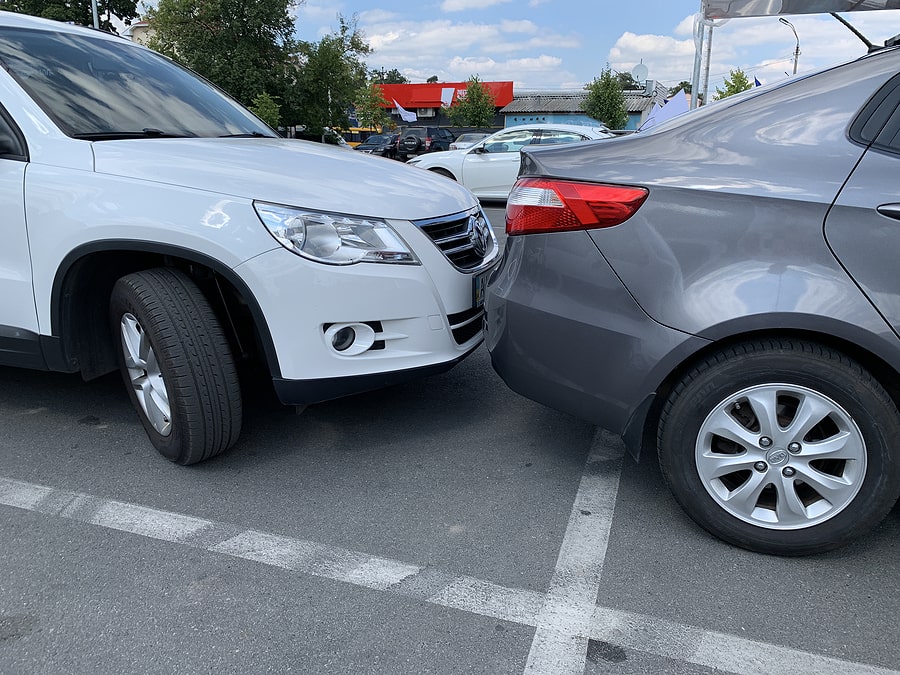Many jobs put employees behind the wheel of a company vehicle. For some jobs, like a delivery driver, the majority of the work is done in the car. For others, like a sales representative, driving might be more incidental to their day-to-day job. Being trusted with a company vehicle is often seen as a great perk of a job, saving the employee from putting miles of wear and tear on their own vehicle. But this benefit can quickly turn into a burden if you get into an accident. No matter the amount of time spent driving a company vehicle, it’s bound to be confusing and stressful when you get into an accident.
In addition to the immense medical and financial stresses after a car accident, employees often worry about their employer’s reaction to the accident. An employee might also struggle to fully understand their options for recovery, which range from workers’ compensation to a lawsuit against a negligent driver.
Read on to understand more about your employee rights and responsibilities after a car accident in a company vehicle and how to pursue recovery for your injuries. For more information about your unique situation, contact a car accident attorney today for a free consultation.
How Common Are Company Car Accidents?
Motor vehicle accidents happen very frequently. In just one year, there were more than 33,000 fatal motor vehicle accidents in the United States and more than 4.4 million injuries caused by car accidents. Transportation incidents cost employers $60 billion annually in medical care, legal expenses, property damage, and lost productivity. Each crash costs an employer an average of $16,500; injury crashes cost an average of $74,000; and fatalities cost an average of $500,000 in addition to the incalculable costs of lives forever lost.
The National Census of Fatal Occupational Injuries found that there were 2,122 work-related transportation incidents in 2019 alone. This represented the most significant increase in incidents since the Bureau of Labor Statistics began tracking the data. Transportation incidents accounted for the largest share of work-related fatalities in 2019 by more than 1,000 incidents. (Falls, slips, and trip incidents amounted to the second-highest cause with 880 incidents.)
Jobs and industries that commonly use company vehicles include:
- Commercial truck drivers
- Sales
- Delivery drivers
- Service providers (technicians, house cleaners, pest control technicians, cable installation, etc.)
The Occupational Safety and Health Administration (OSHA) encourages all employers who provide company vehicles to also provide a driver safety program to foster appropriate driver attitudes, improve behavior, and increase skills. Unfortunately, not every employer is as committed to safety as they should be.
Who Is Responsible?
After the commercial vehicle accident, first you’ll need to understand if any party’s negligent or intentional act caused the accident. Who is at fault?
- Other driver: If another driver’s negligent acts caused the accident, they could be held responsible. Violation of a traffic law or regulation can be compelling evidence of negligence, including speeding, failure to heed a traffic sign or signal, or driving under the influence of drugs or alcohol.
- Manufacturer: If the company vehicle malfunctioned due to a faulty part, the auto parts manufacturer may be responsible for the accident.
- Employee or Employer: If the employee’s negligent act caused the accident, you will need to consider some additional factors before determining who may be responsible. If the employee was acting in the scope of their job duties at the time of the accident, the employer may be held responsible. An act is only in the course of the employee’s employment if it was authorized by the employer or closely related to an authorized act. If, however, the employee was using the company vehicle to run personal errands, the employee remains the potential party responsible for the accident. Additionally, employers are responsible for properly inspecting and maintaining all of the company vehicles in their fleet. If they fail to perform this routine maintenance and they overlook a safety issue, they may be held responsible.
After the accident, be sure to call the police to the scene. The police will prepare a police report that will document key evidence from the accident, including photos of the accident scene, witness information, and any citations issued for traffic violations. If you can’t call the police to the scene, try to collect as much of this evidence as possible by snapping photos with your phone.
Remember: drivers are not the only ones who can cause a car accident. You should also consider any vehicle malfunction or lack of upkeep by the local government. Vehicle manufacturers are responsible for producing safe vehicles that are free from defects, and any defect that causes an accident or contributes to an injury can be considered to be the responsibility of the manufacturer.
Similarly, the local government is responsible for the maintenance of roads and traffic signals. If a stop sign has fallen, causing an accident, the local government may be at fault. Claims against manufacturers and government entities are incredibly complicated, so it is recommended you work closely with your attorney to evaluate the likelihood of recovery.
Who Pays for My Injuries?
At our firm, we understand one of the questions that will weigh heaviest on your mind after an accident is “Who is responsible for the costs of my injuries?” Injuries ranging from mild to severe commonly result from car accidents. Your first priority after an accident should be to secure immediate medical treatment. Not only is this important for your health, but it helps ensure that the defendant cannot claim that any delay contributed to your injuries.
Common injuries after a car accident include:
- Head injuries: Head injuries are common after a car accident. A passenger could be ejected from a vehicle causing a blow to the head, or they might strike their head on a dashboard or other object in the car. Head lacerations or concussions are also common.
- Traumatic brain injuries: In addition to head injuries, some victims suffer a traumatic brain injury (TBI). The symptoms of a TBI are varied and depend on the location and severity of impact to the head. TBI symptoms include physical, sensory, and cognitive effects and can result in a coma or brain death.
- Spinal injuries: The spinal cord is the bundle of nerves that allows the brain to communicate with the body. The effect of a spinal cord injury will depend on which area of the spinal cord is injured, but the symptoms range from numbness to total paralysis.
- Broken bones and fractures: Broken bones will limit a victim’s mobility and ability to manage day-to-day activities. If a break is severe, it will require surgery or ongoing rehabilitation.
- Internal organ damage: Any blow to the body has the potential to cause damage to internal organs including the heart, lungs, and kidneys. Internal organ damage can be difficult to diagnose because symptoms are often delayed, but failure to treat these injuries can have severe consequences. This is why a prompt medical examination is imperative after any car accident.
- Facial and Dental Injuries: If a passenger strikes their face on a hard surface, they have the potential to suffer facial injuries (like a broken jaw) or dental injuries (like cracked teeth.) Many facial injuries require plastic surgery to repair.
- Cuts, bruises, and sprains: While these are commonly thought of as surface injuries, they still have the potential to disrupt the victim’s day-to-day life or leave visible scars.
No matter your injuries, if your accident was caused by another negligent driver or while you were on the job, you may have a claim. Work with your attorney to learn more about what damages you may be eligible to recover.
Understanding recovery is complicated in a company vehicle accident case because workplace injuries are handled through workers’ compensation. Each state’s workers’ compensation scheme has different procedural requirements and provides different benefits, including medical expenses and temporary and permanent disability payments. An attorney will help you navigate the workers’ compensation process to help ensure you receive the benefits you deserve. While workers’ compensation does not provide recovery for certain injuries (such as loss of enjoyment of life), it does not require proof of negligence.
If you were not acting in the course of your employment duties at the time of the accident, you will need to prove that another party’s negligence caused the accident and your injuries. This is often the case: studies have shown that 60% of company car accidents occur during an employee’s personal time.
In that situation, you may seek recovery for all your damages, including:
- Medical expenses: The at-fault party can be held financially responsible for any medical expenses incurred while managing your injuries after the accident, including emergency transportation, surgical procedures, doctors’ visits, and hospital stays. The defendant can also be held responsible for future medical expenses, including assistive devices like a wheelchair or rehabilitation therapy.
- Lost income: Many injuries require the victim to miss work or work a reduced schedule. The victim deserves compensation for these lost wages. If you have not yet returned to work, include the cost of future lost wages and lost earning potential in your damages demand.
- Property damage: If you were driving a company vehicle, you will not have to worry about the costs of a damaged vehicle. However, this does not mean you have not suffered property damage. If you have other personal property that has been damaged, such as electronics, seek recovery for the cost of repair or replacement.
- Emotional distress: A motor vehicle accident can be a harrowing event, often leaving the victim suffering from serious emotional distress such as depression, anxiety, or post-traumatic stress disorder. Company vehicle accidents are often accompanied by an extra level of distress given the potential negative impacts on their work life.
- Loss of enjoyment: People’s lives are made better by participation in activities that bring them joy. Tragically, many injuries limit a victim’s ability to continue participating in these activities. For example, a victim who loves to play an instrument will lose that option completely if they suffer irreparable damage to their hand. The victim deserves compensation for the void this creates in their life.
- Punitive damages: Most damages are meant to compensate the victim for their injuries, but the exception to this is the award of punitive damages. Punitive damages are intended to punish the defendant for egregiously bad actions. Each state has its own rules for awarding punitive damages, and some cap the amount.
Before pursuing any of these damages, you need to know the full extent of your injuries. This amount will be considered by the jury during a jury trial, but it will also be helpful as you assess any settlement offer from the defendant or an insurance provider or through workers’ compensation.
Do not accept any settlement offer without first discussing it with your attorney. An initial settlement offer may be significantly below what you deserve. Accepting a settlement offer can often be the best move, but only if it appropriately compensates you based on the extent of your injuries and the strength of your case.
You will also need to take action promptly. States require that plaintiffs file lawsuits within a set deadline called the statute of limitations. The deadline varies from state to state and can range from one to five years. While this may seem like a lot of time, it will pass quickly as you deal with your injuries and prepare all the evidence needed to file your case. An attorney will work with you to file any court documents on time, preserving your ability to pursue the recovery you deserve.
Contact an Experienced Attorney Today
You’re not alone in this. An experienced car accident attorney can be a critical partner as you seek recovery after an accident in a company vehicle. Your attorney can help you assess your case and develop a strategy to obtain the compensation you are entitled to. This will include assessing liability, understanding whether you should seek recovery through workers’ compensation, managing communication with the other parties, and helping to ensure you receive the recovery you deserve.





